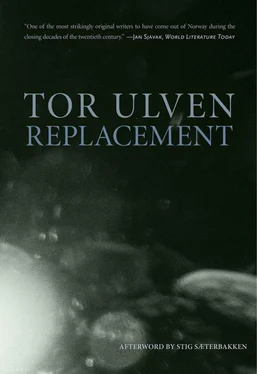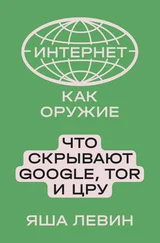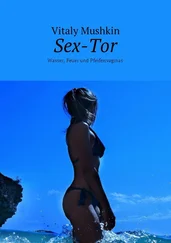Few authors in postwar Norway have had a stronger and more direct influence on their contemporaries and successors. It’s an influence that has helped major talents find their voices and reduced lesser talents to mere epigoni. And it’s an influence that is, so to speak, inversely proportional to the bibliography. Five poetry collections and five prose works, that’s all Tor Ulven (b. 1953) published from the time he debuted in 1977 to the day he took his own life in 1995. Around a thousand and a half pages, including posthumous publications: a compact and concentrated whole, divvied out piecemeal, for the most part in small portions, like the lifework of a Cioran or a Vermeer.
His debut work, a poetry collection entitled Skyggen av urfuglen (The Shadow of the Primordial Bird), exhibits clear traits of surrealism. This was already a well-established interest (Ulven showed his own drawings at the World Surrealist Exhibition in Chicago in 1976!) that would last his entire life (his translation of René Char’s poems appeared in 1985), though in this first book it was still unripe: a promising bud rather than a full autumn crop. Indeed, when Ulven was in charge of putting together a collection of his selected poetry in 1993, he took only a few poems from this first work. The true poet emerged in the two following collections, Etter oss, tegn (After Us, Signs, 1980) and Forsvinningspunkt (Vanishing Point, 1981).
A six-year-long span of retreat and isolation was finally broken by what shoulg be considered one of Ulven’s major works, Det tålmodige (Patience), in 1987. Artifacts, ruins, fossils, junk, archeological finds, human remains (in every sense): it’s all there, all bundled together; durability contrasts with decay to form an overarching perspective, which is captured in the multifaceted title; patience emerging as the (one) thing that endures, an eternal constant, the observing human consciousness that, unaffected by time’s passage, remains unshaken as it describes the continuity of things, those insentient substances with no alternative but perpetual being, continuous existence. Regarded in this way, we could say that Det tålmodige brings Ulven’s poetic project to a head, thereby releasing the prose-writer in him.
Gravgaver (Burial Gifts) was published the following year, with the subtitle, or genre heading, if you will, of Fragmentarium (Fragments), a novel in pieces, which expands on the theme of decay from Det tålmodige in beautiful, musical prose sequences. These two works are separated by a single year, as if they’re standing there, back to back, two masterworks mutually supporting one another, Ulven’s last pure poetry collection and his first pure work of prose. Taken together, they form a melancholy magnum opus, whose thesis, in short, is that everything is already past, that everything we’re capable of understanding and reflecting upon has already happened, has already been. And at the same time: the past is present, the past is now. We live on the trash heap of history, occupied with ordering and organizing an overwhelming collection of memories, both our own and those of others. By the time something finally reaches us, it’s already gone. Understanding is afflicted with a time delay. It’s “[a] daily walk on top of five thousand two hundred and fifty-five leftover chickens, three hundred mutton thighs, an indeterminate number of pottery shards, a dozen loaded dice, a peacock, six hundred and thirteen mussels, a bag of copper coins, two hundred and fifty hairbrushes, fragments from a kingly helm, a guinea pig’s skeleton, a ceramic oven, the pieces of a wall, sundry turtle shells, a work station for making pipe bowls, among countless other things,” as Gravgaver puts it. To live in the now is synonymous with living in the past. Whether something happened five minutes ago or five thousand years ago, it all exists simultaneously. The past expands, the future contracts.
An intensely productive period followed the publication of Det tålmodige and Gravgaver , resulting in about one book a year until the time of Ulven’s death. The majority of these works are written in prose, with genre headings that alternate between “stories” ( Nei, ikke det [No, Not That, 1990], and Vente og ikke se [Wait and Not See, 1994]), “prose pieces” ( Fortæring [Consumption, 1991]) and “novel” ( Avløsning [ Replacement , 1993]). Søppelsolen (Junk Sun), which appeared in 1989, is a mixture of poetry and prose, while Stein og speil (Stone and Mirror), Ulven’s last complete work, published posthumously, offers a mixture of literary modes, even including some short plays. In addition to the posthumous poems and essays, a complete Samlede dikt (Collected Poetry, 2000) and a complete Prosa i samling (Collected Prose, 2001) have also been released, together with multiple books on Ulven’s craft.
*
The works an author translates provide clues to his or her linguistic and philosophical ballast. Put another way: Show me what you’ve translated, and I’ll tell you who you are. Together with the aforementioned Char translation, Ulven translated Fizzles by Samuel Beckett and La chevelure de Bérénice by Claude Simon. If we connect these points, we end up with a constellation we might well call ulven (the wolf). From Char he gets the imaginative sensibility and the over-the-top creativity, knowing no bounds. From Simon he gets the expansive syntax and colorful word pictures, the endless supply of images that invoke physical reality. From Beckett he gets the linguistic precision, the down-to-the-millimeter exactness, the brilliant pessimism, and last but certainly not least, the humor (which is often overlooked in Ulven’s texts, just as it’s often overlooked in Beckett’s, reverently shoved aside in favor of a form of awe for the gloom and doom that supposedly characterize them both, despite history’s overwhelming evidence to the contrary, namely, that the greatest pessimists are also the greatest humorists (and what else is there in life to laugh at than misery, tragedy, and suffering?)).
Like Beckett, furthermore, Ulven has a penchant for negatives (it’s no accident that the word “not” occurs in two of his book titles), often characterizing things as much by what they’re not as what they are, part of a negative proof — not of God’s existence, but of reality’s existence. The phrase “it’s not raining,” for example, occurs more than once in Replacement . People are treated in the same way. At this point, it’s difficult not to think of Schopenhauer, who inspired Ulven — he wrote an essay on the philosopher entitled “En form for ubehag” (A Form of Discomfort, 1988) — particularly his thoughts concerning aesthetic distance to the world. “Aesthetic,” in this sense, is understood to mean the state of being intensely present, but also sharply distanced, the individual reduced to a mere observer, so to speak, which for Schopenhauer was the very essence of genius: “the capacity to remain in a state of pure perception, to lose oneself in perception, to remove from the service of the will the knowledge which originally existed only for this service. In other words, genius is the ability to leave entirely out of sight our own interest, our willing, and our aims, and consequently to discard entirely our own personality for a time, in order to remain pure knowing subject , the clear eye of the world.”1 And what was it that Milton said? “They also serve who only stand and wait.” (From the poem “On His Blindness.”) At the same time, Ulven also recognizes that our observations and perceptions of reality are themselves creative, endlessly creative; that our will and representations are endlessly active in the world, a fact that makes the ideal of neutrality, or passivity, impossible.
Читать дальше












